- Home
- Tracy Cooper-Posey
The Unaccompanied Widow
The Unaccompanied Widow Read online
Get Tracy’s Free Starter Library
One of the privileges of writing is sharing the fun and joy of stories with my readers. I send newsletters with details on new releases, special offers, deals and news about my books.
From among the most engaged and long-term subscribers, I offer Street Team membership and the chance to read all my new books before they’re published.
Sign up for my mailing list and get three free books, as a sample library, and join the community of readers who love good stories told well.
See details after you have enjoyed The Unaccompanied Widow
Table of Contents
Get Tracy’s Free Starter Library
About The Unaccompanied Widow
Praise for the Adelaide Becket series
Title Page
The Story So Far…
The Unaccompanied Widow
Get Tracy’s Free Starter Library
Did you enjoy this book? How to make a big difference!
About the Author
Other books by Tracy Cooper-Posey
Copyright Information
About The Unaccompanied Widow
Lady Adelaide is on her own…
In Edwardian Britain, Lady Adelaide Azalea Margaret de Morville, Mrs. Hugh Becket, continues her work for William Melville, spymaster. Adele accompanies King Edward and Queen Alexandra to Dublin where the King will attend the Irish International Exhibition. Events go awry even before they depart England, for the Irish Crown Jewels are stolen and King Edward takes the theft as a personal insult to the Crown.
Then the renown Irish MP, Eilish Slane, who is a personal friend of the King’s, is found murdered in a Dublin hotel. Adel attempts to investigate while navigating the shoals of the King’s temper, the actions of Irish Nationalists, the provocations of the British and Irish press, and the prejudices of men everywhere. And she must work alone, for Melville and his cohorts remain in England…
This novelette is the third in the Adelaide Becket Edwardian espionage series.
1: The Requisite Courage
2: The Rosewater Debutante
3: The Unaccompanied Widow
…and more to come.
A historical suspense espionage novelette.
Praise for the Adelaide Becket series
Tracy takes you again back in time to an era you could only imagine about but brings it in vivid color through her story
A delightful game of cat and mouse
I thoroughly enjoyed this magnificent first in series book!!
The writing style is easy to read and the plot COMPLETELY unpredictable!!
It was a marvelous escape from reality
Breathtaking start to a fantastic new series by Tracy Cooper-Posey.
Succinct and yet rich in the details that create historical immersion and scenes I found easy to imagine being a part.
I loooove good quality writing and I love a new series like a junkie. Just give it a try, you won't be disappointed!
The Story So Far…
If you have not yet read the first two stories in this series, The Requisite Courage and The Rosewater Debutante, this summary will reveal spoilers!
Lady Adelaide Azalea Margaret de Morville, Mrs. Hugh Becket, lived in the Cape Colony with her commoner husband for eight years and during that time learned to speak fluent German. Adele was widowed in a tragic accident and returned to London in early 1906.
William Melville, a former Scotland Yard senior official and now a shadowy figure in the British government, recruits Adele to help him uncover German agents in Britain, who seek to weaken the Empire. Adele also meets Daniel Hargrave Bannister II, Baron Leighton, whom Melville also employs.
While Adele learns how to operate in Melville’s shadowy world, she foils a German conspiracy surrounding King Edward at Balmoral and uncovers an agent among Britain’s peerage. Her confidence in herself and her abilities grows with each achievement, yet she struggles to further her relationship with Daniel, for both are busy defending Britain.
Now read on…
The Unaccompanied Widow
Calafort Átha Cliath (Dublin Port), Dublin, Ireland. Midday, July 9th, 1907.
It had been not quite a year since Adele had accompanied King Edward on an official visit to Germany. She had dreaded that journey, which had been utterly uneventful. Even the King himself had failed to achieve his hoped-for agreement from the Kaiser.
Now Adele was part of the King’s entourage again and this royal visit could not be more unlike that one, for it had become an unmitigated disaster even before the royal yacht had departed—and they were still to set foot upon Irish soil.
Adele clutched the rail of the top promenade deck and watched the grey, choppy waters of Dublin Port pass beneath the bow of the ship. On either side of the royal yacht, dozens of smaller craft tooted their steam whistles and their passengers waved and cheered. Two tugs guided the ship to its berth, their smokestacks chuffing.
It was an overcast day, the clouds grey and low enough that one might reach up and prod their rain-filled bellies. A stiff, chill breeze blew across the open water, stinging Adele’s cheeks and bringing with it the scent of salt and seaweed accompanied by a hint of thick, over-heated diesel oil and the stench of sun-dried fish.
The bleak outlook matched Adele’s mood. She would much rather be sitting before the fire in her little house in London, the teapot beside her, than here on the royal yacht. In this respect, the outing to Ireland was no different from the royal visit to Germany last year. She had no wish to be among the King’s entourage this time, either.
Adele’s reluctance stemmed from different reasons today…or perhaps not, in the end, were her reasons all that much different, for on both occasions she had not wished to linger near King Edward.
By rights, Edward and Queen Alexandria should be upon this deck, waving to their Irish subjects as the ship was tugged along the narrow port. But Edward was in a fine temper over the loss of the Irish Crown Jewels, which had been reported only two days before the court was due to leave for Ireland. Edward interpreted the theft as a direct insult to the Crown, coming so close to his attendance at the Irish International Exhibition. He had ignored the evidence which suggested the jewels might have been stolen weeks before. Instead, he snapped at everyone and had grown mulish.
He had demanded the investiture of the second Baron Castletown into the order of St. Patrick, when the jewels would have been worn, be cancelled. Refusing to step out upon the deck where Dubliners could see him was only the latest outburst.
Adele had tried to ignore the small voice in her mind which suggested the King’s unpredictable mood resembled the tantrums her son had once showered upon her. It felt disloyal to compare the King’s behavior to that of a two-year-old.
Her thinning empathy for the King’s upset had pushed her out into the bracing sea air in search of a more positive perspective. After forty minutes of gazing at the city they approached, with her cheeks numb and her nose frozen, Adele still could not rid herself of the bleak, unsettled feeling which sat upon her shoulders and stirred her belly.
“Oh, do stop hedging!” she railed at herself, only to have her words whipped away by the wind. Even here, deep inside the port, the wind still whistled. “Say it, Adelaide Becket. You’re afraid.”
“Is it all of Dublin you address, Lady Adelaide, or simply the gulls?” The man’s voice came from behind her. The wind had hidden the sounds of his approach, but Adele knew the voice and her heart sank a little lower.
She turned and gave Pureton a polite smile, the best she could manage with her uncooperative cheeks. “Why, it must be the gulls I speak to,” she told him brightly. “For addressing an entire city is the province
of the King.”
“A prerogative of which he will not partake, today.” Sir Godfrey Dale, Baron Pureton, Assistant Private Secretary to the Crown, leaned upon the varnished wood of the railing with a deep sigh. He was a tall, spare man in his late sixties. His hair was thick, but completely white. His full beard and moustache were just as snowy, and outlined a sharp chin and thin cheeks above hawk-like cheekbones and a long, elegant nose. His eyes were pale blue, and sharp with intelligence. The high forehead added to the elongated length of him.
“The King will remain aboard until tomorrow, then?” Adele guessed. The first official duty of the King’s was to attend the Exhibition on the morrow, now that this afternoon’s investiture had been cancelled.
“You were proclaiming to the gulls about fear, I believe?”
He was changing the subject. Pureton was immovably loyal to the King, to the point of utter blindness when it was necessary. Adele supposed that was an ideal trait for an Assistant Private Secretary.
But now that left her to answer a question she had no wish to respond to. “Oh, a new city, new faces…I am too much a homebody, Sir Godfrey.”
He glanced at her. “You did not seem to mind the novelties of Berlin,” he pointed out.
Adele clutched the railing with both hands as the entire ship shuddered as it kissed the wharf. Dock workers shouted to each other as ropes were tossed and secured about bolls.
Most of the entourage surrounding the King presumed Adele was among them to purportedly serve Queen Alexandra, while actually serving the King’s private…appetites. There were very few people who knew her true role, but Pureton was one of them. She could answer truthfully if she wished.
Yet she hesitated. The reasons for her fear all seemed…weak. Feminine.
William Melville had slipped into her house mere hours before she was due to depart for King’s Cross Station to join the royal party upon the train which would take them to Holyhead overnight. He had picked up a piece of shortbread from the plate beside the teapot and broken the news to her that he would not be among those numbers.
“Not even as one of the crew?” Adele asked, alarmed. Melville was adept at posing as laborers, navvies and workers to linger unremarked and eavesdrop upon conversations presumed to be private, or to follow someone of interest. She had been attempting to learn from his example for over a year.
“I must travel to York tomorrow,” Melville told her. “There is something else I must attend to.”
“But…but that will mean I am on my own.” She sank upon the arm of the sofa, careless of the impropriety of such a casual pose. “When is Daniel due back?”
Daniel Bannister, Baron Leighton, was a beau of sorts, when he was not working for Melville, which was a rare occurrence, these days. He was currently in France, eavesdropping upon yet more conversations.
“Tuesday,” Melville replied. “You will be fine on your own, Lady Adele.”
She gripped her hands together. “But you have always been nearby…even at a distance,” she pointed out. “You or Daniel. You even turned up in Germany—don’t think I didn’t see you.”
“You did, hmm?” He looked both pleased and disturbed. “What gave me away?”
“You took a biscuit from a platter on the King’s buffet table.”
Melville looked down at the shortbread in his hand, put it back upon her plate and brushed his hands of crumbs. “The fact is, we’re spread too thin,” he said, with a candid air. “If I had another dozen men, I would spare one to accompany you, but there it is. You’ll just have to rub along without us. We all have our duties.”
She clenched her hands even more tightly. “But what if something goes wrong?” she whispered.
“Then you must cope, Lady Adele. I will not have the King travel without one of us nearby to run interference should the Germans try something while he is away from England.”
She had not schooled her expression to complete neutrality, for his tone was milder as he added, “You have a perfectly good head upon your shoulders, and you have learned a great deal since you came to work for me. Keep your head and don’t act without thought. Besides, it is only Dublin.”
“Where Nationalists seethe and conspire,” she replied tartly.
“Leaving no elbow room for the Germans,” Melville said.
Adele gave up. She pushed the fingered piece of shortbread into Melville’s hand and saw him out, then closed down her house and travelled to the train station. Her heart had not completely steadied since then, and the King’s chancy temper had not improved the matter.
But she would not admit to Pureton that in Berlin, Melville had been close by if things should go wrong. In every assignment Melville had given her since she had met him, he or Daniel had been on hand, even if at a distance.
Pureton was very old-school. He believed women were quite unable to think for themselves. She knew he tolerated her presence near the King, because Edward liked her. Quite likely, he believed the rumors that the King was having an affair with her, too, for in Pureton’s regard, women were fit for little else.
Adele would not support his belief by admitting the source of her fear. Instead, she straightened and pulled the fur more firmly around her throat. “If the King is to remain aboard tonight, I believe I will find a hotel…if that suits you, Sir Godfrey?”
His smile was knowing. “With the Queen aboard, I do not believe your absence will be noticed. By all means, find your hotel, Lady Adelaide.”
She seethed, but made herself smile. “Is there an establishment you would recommend?”
“Indeed. The Shelbourne Hotel is highly respectable, frequented by most of the upper class.” He stood and touched the brim of his hat. “We shall see you at the Exhibition tomorrow, then.”
Adele brushed passed him and went to repack her trunk.
THE CAB DROPPED HER IN front of the Shelbourne Hotel, on Baggot Street. While two of the staff hurried to remove her trunk and take it into the hotel, Adele paid the cab driver and lingered upon the pavement to study the park across the road. It looked like a very pleasant place.
The clouds had grown tattered and were blowing away, letting the sun play upon green leaves and grass, and a pretty wrought iron fence separating the park from strollers upon the footpath. Adele glimpsed statuary and flowers inside the fence.
A footman cleared his throat, next to her. “Shall I show you t’ front desk, m’lady?” His accent was charming.
She gave him a smile. “Please, yes. Lead on.”
The interior of the hotel was as grand as Pureton’s recommendation had implied. White marble dominated—on square columns, arches, round columns and the roof. The floor was also white marble, with a thick carpet muffling footsteps. The tops of the columns and the vaults of the ceiling were gilded. Tall vases of freshly cut blooms perfumed the air, and the chandelier overhead glowed with a steadiness that told her it was powered by electricity. It was a modern touch that pleased her.
She moved over to the front desk, taking off her gloves. The clerk behind the desk gave her a smooth nod. “M’lady.”
“I require a room for three nights, thank you.”
The clerk pulled the heavy registrar over in front of him, plucked his pen out of the inkwell and tapped it off. “Is m’lady accompanied by her husband?”
Irritation bit her. “I am a widow,” she said coldly.
“Unaccompanied,” the clerk pronounced, as he wrote.
“I am Lady Adelaide Azalea Margaret de Morville, Mrs. Hugh Becket,” she told him. “I am part of King Edward’s royal party and will be accompanying the King to the Exhibition tomorrow and Thursday.”
The man’s shoulders straightened. He glanced at her, and she saw surprise in his eyes, although his features remained quite fixed. “Lady Adelaide,” he said, his head bowing once more. He turned and plucked a key from the board behind him and held it out to a footman. “Please let me know if there is anything I can do to assist you while you are our guest.”
“I would like some fresh fruit in my room, please.”
“Of course, my lady.”
She glanced around the long, narrow entrance hall and nodded toward an archway opposite the desk. “Is that the dining room? Is lunch still being served?”
“Alas, I regret that the dining room is closed until this evening, my lady.” The clerk didn’t sound all that upset about it.
“Then please have a roast beef sandwich delivered to my room, too.” Adele turned and followed the footman up the narrow stairs to the third floor. It could have been worse—she might have been relegated to a room on the next and highest level. Her trunk hung between two more footmen, who hurried ahead of them.
The room was unlocked and her trunk placed upon a stand which appeared to be made just for that purpose, while she removed her hat, stole and coat and moved over to the large window and looked down upon the park which lay on the other side of the cobblestoned road.
“Is the park a public park?” she asked the footman, as he placed her key upon the chest of drawers by the door.
“It is, m’lady. St. Stephen’s Park.”
“Thank you.”
He gave a jerky bow and left, closing the door behind him. Her sandwich and fruit arrived upon a trolley, with white linen napkins and a silver dome, a short while later. Adele ate, ravenous now that she was warm, once more. She glanced at the six books she had placed upon the bedside table, but the bright sunlight streaming through the window drew her attention, instead.
After her small meal was finished, she changed into an afternoon gown—this one had the very modern hemline that came as high as her ankle and revealed her boots. She wasn’t sure what to make of the high hemlines that were fashionable for daywear, but they did make walking very convenient. She didn’t have to lift her skirts out of the way of puddles or gutters. But she still did not have the courage to wear anything but floor-length hems in the presence of the King, or Queen Alexandra, who was very traditional, too.

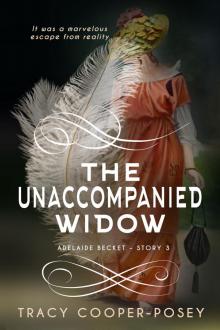 The Unaccompanied Widow
The Unaccompanied Widow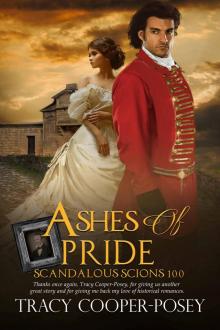 Ashes of Pride
Ashes of Pride Inside Man
Inside Man Kiss Across Seas
Kiss Across Seas Kiss Across Chaos
Kiss Across Chaos But Now I See
But Now I See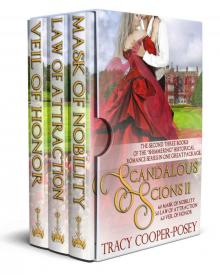 Scandalous Scions Two
Scandalous Scions Two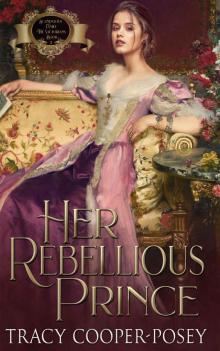 Her Rebellious Prince (Scandalous Family--The Victorians Book 2)
Her Rebellious Prince (Scandalous Family--The Victorians Book 2)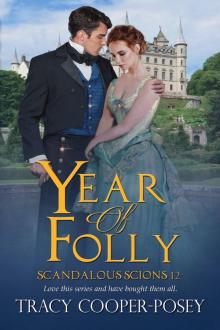 Year of Folly
Year of Folly Suns Eclipsed
Suns Eclipsed Quiver and Crave
Quiver and Crave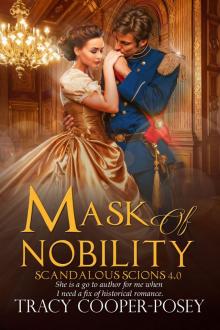 Mask of Nobility
Mask of Nobility The Second Trinity
The Second Trinity Kiss Across Tomorrow (Kiss Across Time Book 8)
Kiss Across Tomorrow (Kiss Across Time Book 8) Lost At Sea
Lost At Sea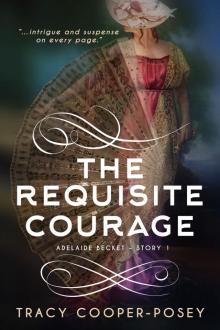 The Requisite Courage
The Requisite Courage Evangeliya
Evangeliya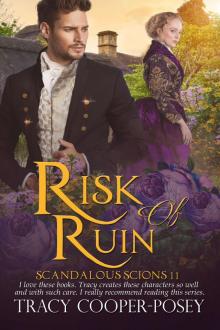 Risk of Ruin
Risk of Ruin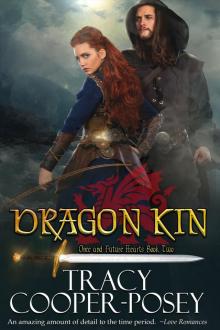 Dragon Kin
Dragon Kin War Duke of Britain
War Duke of Britain Scandalous Scions One
Scandalous Scions One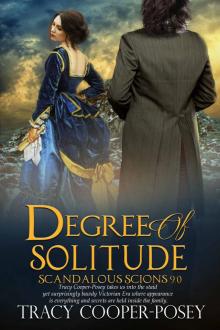 Degree of Solitude
Degree of Solitude Kiss Across Worlds (Kiss Across Time Book 7)
Kiss Across Worlds (Kiss Across Time Book 7)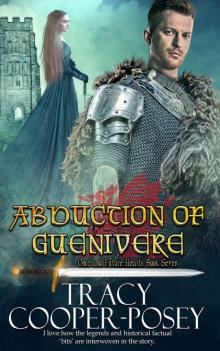 Abduction of Guenivere (Once and Future Hearts Book 7)
Abduction of Guenivere (Once and Future Hearts Book 7) Junkyard Heroes
Junkyard Heroes Flying Blind
Flying Blind Amor Meus
Amor Meus Heart Strike (Project Kobra Book 3)
Heart Strike (Project Kobra Book 3) High King of Britain
High King of Britain Arctic Ambush
Arctic Ambush Romani Armada (Beloved Bloody Time)
Romani Armada (Beloved Bloody Time)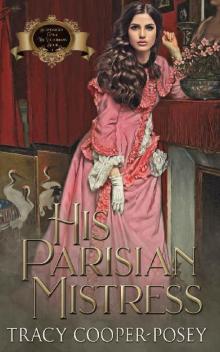 His Parisian Mistress (Scandalous Family--The Victorians Book 1)
His Parisian Mistress (Scandalous Family--The Victorians Book 1)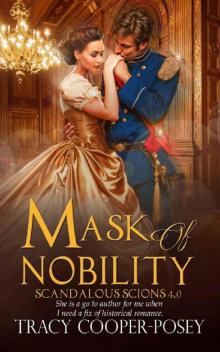 Mask of Nobility (Scandalous Scions Book 4)
Mask of Nobility (Scandalous Scions Book 4)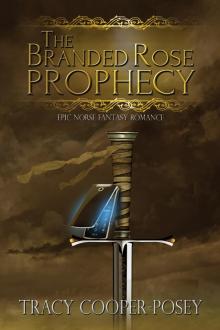 The Branded Rose Prophecy
The Branded Rose Prophecy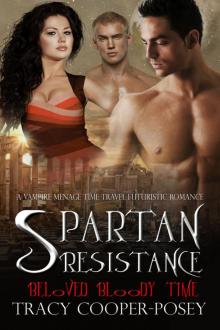 Spartan Resistance
Spartan Resistance Byzantine Heartbreak (Beloved Bloody Time)
Byzantine Heartbreak (Beloved Bloody Time)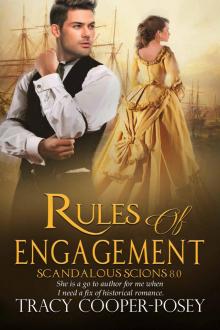 Rules of Engagement
Rules of Engagement Once and Future Hearts Box One
Once and Future Hearts Box One Soul of Sin (Scandalous Scions Book 2)
Soul of Sin (Scandalous Scions Book 2)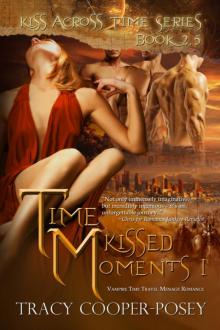 Time Kissed Moments 1
Time Kissed Moments 1 Blood Revealed
Blood Revealed Cat and Company
Cat and Company Byzantine Heartbreak
Byzantine Heartbreak Casualties of War
Casualties of War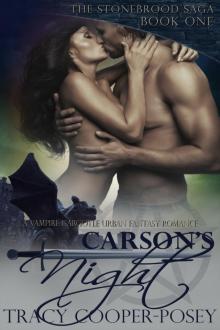 Carson's Night
Carson's Night Pendragon Rises
Pendragon Rises Terror Stash
Terror Stash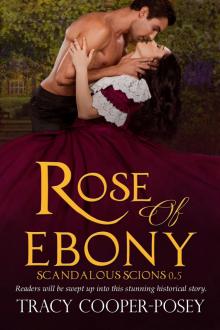 Rose of Ebony
Rose of Ebony Zoe's Blockade (Destiny's Trinities Book 5)
Zoe's Blockade (Destiny's Trinities Book 5) Blood Ascendant (Blood Stone Book 5)
Blood Ascendant (Blood Stone Book 5)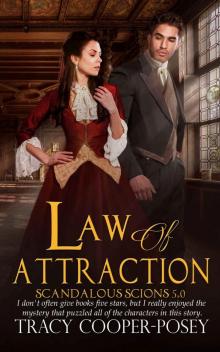 Law of Attraction
Law of Attraction Varken Rise
Varken Rise Blood Unleashed (Blood Stone)
Blood Unleashed (Blood Stone) Prisoner of War
Prisoner of War Vistaria Has Fallen
Vistaria Has Fallen Kiss Across Deserts
Kiss Across Deserts Terra's Victory (Destiny's Trinities Book 7)
Terra's Victory (Destiny's Trinities Book 7) Unbearable
Unbearable Faring Soul - Science Fiction Romance
Faring Soul - Science Fiction Romance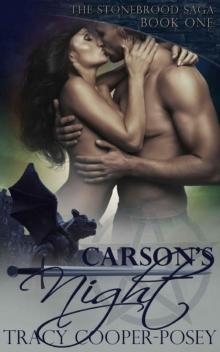 Carson's Night (The Stonebrood Saga)
Carson's Night (The Stonebrood Saga) Mia's Return
Mia's Return Kiss Across Swords (Kiss Across Time Series)
Kiss Across Swords (Kiss Across Time Series) Bannockburn Binding (Beloved Bloody Time)
Bannockburn Binding (Beloved Bloody Time) Beauty's Beasts
Beauty's Beasts Beth's Acceptance
Beth's Acceptance Kiss Across Kingdoms
Kiss Across Kingdoms Promissory Note
Promissory Note Blue Knight
Blue Knight Blood Stone
Blood Stone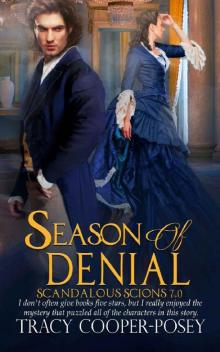 Season of Denial (Scandalous Scions Book 7)
Season of Denial (Scandalous Scions Book 7) Kiss Across Chains (Kiss Across Time Series)
Kiss Across Chains (Kiss Across Time Series) Yesterday's Legacy
Yesterday's Legacy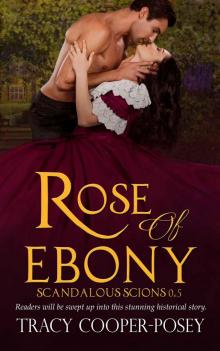 Rose of Ebony (Scandalous Scions Book 1)
Rose of Ebony (Scandalous Scions Book 1) Valor of Love (Scandalous Scions Book 2)
Valor of Love (Scandalous Scions Book 2) Hostage Crisis
Hostage Crisis Fatal Wild Child
Fatal Wild Child Octavia's War
Octavia's War Beth's Acceptance (Destiny's Trinities)
Beth's Acceptance (Destiny's Trinities) 5,001 - A Science Fiction Romance Short Story
5,001 - A Science Fiction Romance Short Story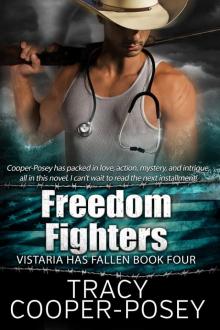 Freedom Fighters
Freedom Fighters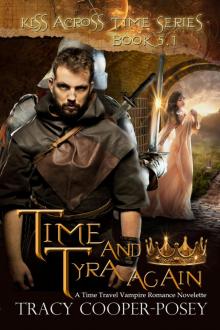 Time and Tyra Again
Time and Tyra Again Harvest of Holidays
Harvest of Holidays Kiss Across Chains
Kiss Across Chains Sabrina's Clan
Sabrina's Clan Red Leopard (The Vistaria Affair Series)
Red Leopard (The Vistaria Affair Series)